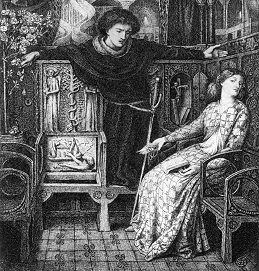 My friend and I were discussing the production of "Hamlet" we'd seen two weeks ago, and how we'd continued to probe it, remembering versions we'd seen in the past and the thoughts we'd had reading the text as younger versions of ourselves. As young women, we had fixated on the doomed romance of Hamlet and Ophelia. Ten years later, however, I identify far more with Hamlet himself and his classic wavering between thought and action; stunted resolve, and distrust of thought itself. To think and to do: these strike me as two of the greatest challenges of my twenties. The self emerges slowly, many-pointed. The world the self desires exists across a gap that can only be crossed through action, but how to turn those half-formed desires and images into the right action? That can also be the question. Of course, the character of Hamlet is far, far deeper than the mere action vs. inaction dilemma. In fact, discussing him, and how we might self-importantly identify with him, led my friend to introduce me to the following delightful poem by Carl Sandburg:
My friend and I were discussing the production of "Hamlet" we'd seen two weeks ago, and how we'd continued to probe it, remembering versions we'd seen in the past and the thoughts we'd had reading the text as younger versions of ourselves. As young women, we had fixated on the doomed romance of Hamlet and Ophelia. Ten years later, however, I identify far more with Hamlet himself and his classic wavering between thought and action; stunted resolve, and distrust of thought itself. To think and to do: these strike me as two of the greatest challenges of my twenties. The self emerges slowly, many-pointed. The world the self desires exists across a gap that can only be crossed through action, but how to turn those half-formed desires and images into the right action? That can also be the question. Of course, the character of Hamlet is far, far deeper than the mere action vs. inaction dilemma. In fact, discussing him, and how we might self-importantly identify with him, led my friend to introduce me to the following delightful poem by Carl Sandburg:
THEY all want to play Hamlet./They have not exactly seen their fathers killed/Nor their mothers in a frame-up to kill,/Nor an Ophelia dying with a dust gagging the heart,/Not exactly the spinning circles of singing golden spiders,/Not exactly this have they got at nor the meaning of flowers—O flowers, /flowers slung by a dancing girl—in the saddest play the/inkfish, Shakespeare, ever wrote;/Yet they all want to play Hamlet because it is sad like all actors are sad/and to stand by an open grave with a joker’s skull in the hand and then to say/ over slow and say over slow wise, keen, beautiful words masking a heart/that’s breaking, breaking,/This is something that calls and calls to their blood./They are acting when they talk about it and they know it is acting to be/particular about it and yet: They all want to play Hamlet.
Our hearts are breaking, breaking, and we are sad like all writers are sad. Self-importance pops, fizzes away: a deflated balloon. Still, it's interesting to consider how our relationship to texts and the characters therein change over time--in concert with our own situations in life, our richening perspectives. Once I have children, will I identify more with the blustering Polonius or the aching, mistake-riddled Gertrude?




No comments:
Post a Comment